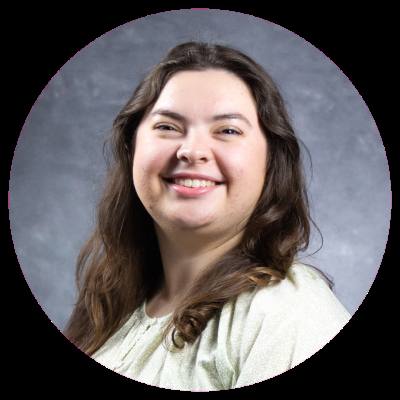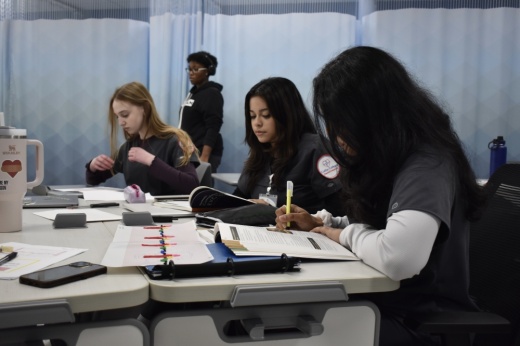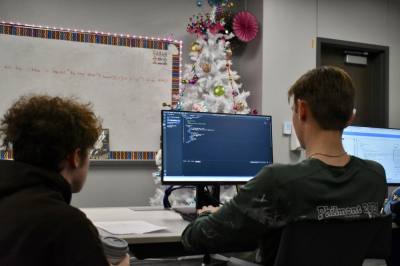Students from Rock Hill High School’s electrocardiogram technician program are trained to work in a hospital, Health Science teacher Lori Lewis said. Those in the program undergo 40 clinical hours in a hospital while training for their Certified EKG Technician exam, she said. This prepares them for jobs after graduation or for further education.
“It gives them a really good foundation,” Lewis said.
The big picture
Health science is one career and technical education, or CTE, program offered through PISD. While the course is focused on health care, students learn transferable skills, such as professional communication with patients.
“[Communication] is a big skill that is lacking at the high school level,” Lewis said. “These kids get a great benefit by talking to real-life people.”
For CISD, the CTE program offerings have more than doubled since 2019, the district’s Director Ryan Contreras said. In that time, student enrollment for the CTE program has grown 90% for the fall semester of the 2023-24 school year, he said.
Contreras said students do not pay out of pocket for CTE courses and only pay for Collin College tuition when it is a dual credit course.
Those who take advanced courses benefit from exploring careers and gaining experience in a field, Contreras said.
“[Students] get practical experience and can go out and apply it into the real-life business world,” he said.
The approach
PISD officials are working to offer more certifications through the CTE program, said Christie Micks, a Rock Hill computer science teacher.
“We have to target what we’re wanting [students] to do in the workforce,” Micks said.
Learning a variety of computer coding languages helps students when compiling a portfolio for college and job applications, Rock Hill student Natalia Cano said.
“You can really find what you want to do by taking CTE courses,” said the high school senior, who plans to major in computer science in college.
A student can learn if they don’t like a field, but can also become passionate about a program while still in school, Contreras said.
“There’s a benefit to picking and choosing one program of study and sticking with it,” he said.
About the program
In the advanced levels of CTE courses, students complete a practicum to get hands-on experience in their field, Contreras said.
“The goal is to make sure students are career ready [and] either prepare them for college or jobs,” he said.
In PISD’s CTE health science program, students get experience in hospitals, nursing homes and emergency medical care through a Collin College practicum, Director of Advanced Academics Seth Rutledge said at an Oct. 16 board meeting.
“[Students] are getting hands-on practice they wouldn’t get otherwise,” he said.
Students in a CTE course are more likely to come to school and succeed, Contreras said.
CTE learners, which are students taking at least two career and technical courses, outperform peers on all areas of State of Texas Assessments of Academic Readiness end-of-course assessments, PISD’s CTE director Julie Anderson said. Earning industry-based certification makes students marketable for college and jobs, she said.
“Our students are seen as more valuable for entry into college,” Anderson said.
The programs also encourage participation through student organizations, such as Future Farmers of America and Health Occupations Students of America, he said.
"There’s a real benefit to CTE ... It prepares them for life after high school,” Contreras said.
Going forward
The health science program has grown the most in CISD’s CTE program, Contreras said. The program had its first cohort go through the program and had 12 students earn a Certified Nurse Assistant or Patient Care Technician certification in the 2022-23 school year. In the next school year, Contrereas said the district is working to expand into pharmacology.
“It gives students another option with the health science program of study,” he said.
CISD is also working to pilot an Esports program with Region 10 Education Service Center, a regional agency that supports public schools. The district works with Region 10 to track trends and work closely with workforce development, he said.
“We want to make sure we develop the student in the whole picture,” Contreras said.






